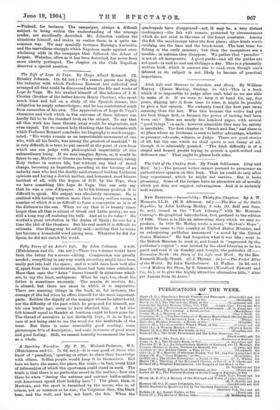The Life of Lope de Vega. By Hugo Albert Rennert.
(R. Brimley Johnson. 12s. 64. net.)—We cannot praise too highly the industry with which Professor Rennert has collected and arranged all that could be discovered about the life and works a Lope de Vega. He has availed himself of the labours of J. R.' Cherley (brother of the better-known Henry Chorley), who spout much time and toil on a study of the Spanish drama; this obligation he amply acknowledges ; and he has contributed much from researches of his own. The appreciation of Lope de Vega's character and work which is the outcome of these labours can hardly fail to be the standard book on the subject. To say that all this work has been thrown away would be ungracious, and even unjust. Yet we cannot help thinking that the estimate with which Professor Rennert concludes his biography is much exagge- rated: "His works remain as an imperishable monument of one who, with all his faults, was among the greatest of mankind." It is very difficult, it is true, to put oneself at the point of view from which one can judge with philosophical impartiality of this .extraordinary being. If we may imagine Byron, or, it would be fairer to say, Marlowe or Greene (as being contemporaries), taking Holy Orders in mature life, but without any kind of moral change, becoming an Inquisitor, presiding at the burning of an unlucky man who had the double misfortune of holding Lutheran opinions and having a Jewish mother, and honoured, most bizarre incident of all, with the degree of D.D. by the Pope, then, we have something like Lope de Vega. One- can only say that he was a cosa d'Espagna. As to his literary position it is difficult to speak. His output was absolutely enormous. He is credited with having written more than twenty million verses, a number of which it is as difficult to form a conception as it is of the distance to the sun. When we say that it is twenty times larger than all that is extant of Greek and Latin poetry, we are still a long way off realising the bulk. And as to its value ? He worked a great revolution in the drama of Spain; he was for a time the idol of the theatres. But his real merit it is difficult to estimate. One thing may be safely said,—nothing that he wrote has become a household word among men. Whatever he did for Spain, he did not enrich the world.






































 Previous page
Previous page